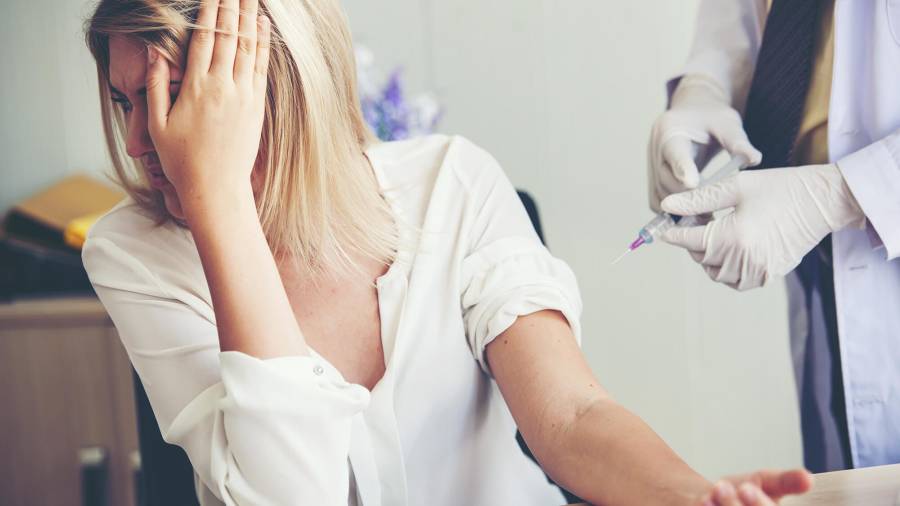Hypnosis for Needle Phobia
Overcoming the Fear of Injections
Needle phobia (the fear of needles) is a common type of phobia. It belongs to a broader category of phobias called blood-injection-injury type phobia (BII phobia). It can significantly impair the lives of those affected by it. Read more about how Hypnosis Berlin can help you overcome the fear of needles, blood and injury.

Image: Hypnosis for Needle Phobia - Overcoming the Fear of Injections
Needle phobia symptoms
How to recognize needle phobia
For those affected by needle phobia, vaccinations or blood tests are almost unimaginable. Just the idea of needles or seeing blood can cause great anxiety and prevent people from undergoing medical examinations. Nowadays, when COVID vaccines are a daily topic of conversation, affected individuals feel particularly anxious and might avoid talking about the subject of vaccinations altogether. Furthermore, it is not unusual that the anxiety caused by needle phobia can escalate into panic attacks.
Needle phobia can manifest itself in individuals by means of various psychological and physical symptoms:
Needle phobia can manifest itself in individuals by means of various psychological and physical symptoms:
Physical Symptoms
During a direct confrontation with injections, there can be various physical symptoms that are linked to anxiety. These include sweaty hands, racing heart, high blood pressure, trembling of the hands or the whole body, physical tension, cramping, dizziness, nausea, sweating, turning pale, diarrhea and urination. Since there are individuals who react to injections with panic attacks, there might also be individuals who faint - a common side effect when the system is overwhelmed with shock and fear. When individuals have fainted at the sight of needles in the past, it can scar the mind and form particularly unfavorable links to fear and panic resulting from needles. The fear of injections, blood tests, vaccinations and even doctor's offices can be further tied into fearful associations, making the spectrum of what can be triggering broader and broader.
Psychological Symptoms
On a psychological level, needle phobia manifests itself through anxious thoughts and feelings that are very focused on specific triggers. Affected individuals might feel helpless when confronted with needles, injury or blood and they tend to fear losing control or passing out in the situation. Ruminating, cyclical or racing thoughts might occur prior to a doctor's appointment for individuals with needle phobia. Affected individuals often describe that on a rational level they understand that the fear is "unfounded" and that they know “an injection is actually not bad.” Nonetheless, rationally knowing and understanding something does not eliminate fears that originate in the subconscious. This is because our rational understanding and knowing is conscious, while our emotional world tends to be subconscious. This is where hypnosis comes in - since hypnosis directly interacts with and treats the problem through the subconscious, in addition to processing issues consciously during conversations before and after the hypnosis session.
Hypnosis for the fear of needles
The fear of syringes often exists in combination with the fear of blood and fear of injury. In the clinical field, this fear is referred to categorically as blood-injection-injury type phobia. Regardless of whether the fear is more related to injections, blood or injury, hypnosis can help to reduce fears in the long term and build trust towards the body and towards others.
Needle phobia self test
Am I experiencing needle phobia?
The following questions might help you figure out whether you have needle phobia:
-
1
Do you experience intense fear at the thought of visiting a doctor or undergoing a physical examination involving blood tests? -
2
Do you experience any of the following symptoms when you think about needles: racing heart, sweating, trembling, or dry mouth? -
3
Do you avoid doctor visits or skip medical examinations because you are afraid of being confronted with needles? -
4
Are you afraid of pregnancy and the blood tests that would result from it - so much so, that you prefer not to have children? -
5
Do you skip important medical screenings? -
6
Do you avoid certain places where it is quite unlikely for needles to be around out of fear that there might be someone confronting you with needles?
If you can answer yes to most of these questions and feel restricted in your daily life, you should seek medical or therapeutic advice. You may have needle phobia. Please note that questions are asked broadly, so it is possible that people who are not affected by needle phobia may receive a positive result. Not everyone who is uncomfortable with a vaccination or blood tests suffers from needle phobia.
Needle phobia facts
Studies on needle phobia
Needle phobia is not a rare condition - in fact, the fear of syringes is quite common in society. This is illustrated by a study conducted by Nir et al. on 400 middle-aged people. They were asked to participate in a travel vaccination. 21.7 percent of the participants said they were afraid, and another 8.2 percent suffered from severe panic. Some even fainted. Even though the stinging sensation of a needle is perceived differently from person to person - from "hurts a lot" to "doesn't hurt at all" to "I barely felt it" - pain sensations and perception can be alleviated and altered through hypnosis. Additionally, the University of Hamburg-Eppendorf and Charité Berlin study found that participants perceived pain stimuli as more unpleasant when they watched the procedure while being injected or having blood work done. The participants were questioned subjectively and examined objectively by measuring physical reactions like pupil dilation. Looking away from the procedure thus helps to feel the stimulus less, while looking directly at the needle and injection site increases the pain stimulus.
Causes of Needle Phobia
Why are individuals with needle phobia so afraid of injections?
Specific phobias such as needle phobia relate to a single trigger or fear stimulus: the syringe. These fears often have a deeper cause that is very personal and individual. Individuals affected by needle phobia know consciously that their fear is exaggerated or even unfounded. However, they cannot control it or explain to themselves why they react with such fear. On the contrary, they often helplessly witness how the fear increases over time. The causes of these specific phobias often lie in childhood. In many cases, they are unpleasant and stressful experiences during medical, dental or orthodontic treatments in childhood. That is, many adults describe deep-seated fears, some of which have existed for decades and began in childhood.
Fear may also be passed down through parents. Additionally, early traumatic experiences from other areas of life may manifest as a "specific phobia" during adolescence or adulthood.
Fear may also be passed down through parents. Additionally, early traumatic experiences from other areas of life may manifest as a "specific phobia" during adolescence or adulthood.
Consequences of Needle phobia
What consequences can needle phobia have?
When initially reflecting on needle phobia, one might imagine that it rarely plays a role in the life of affected individuals. After all, we rarely come into contact with needles in our daily life - our interactions with syringes are usually only during medical procedures, right? But this impression is deceptive. BII phobia, i.e. phobia of blood, injections and injury, intervenes much more widely in the lives of those affected than we generally think possible. There are both health effects and psychosomatic consequences.
The consequences of needle phobia include:
The consequences of needle phobia include:
- Affected individuals avoid doctor visits and important medical examinations.
- Vaccinations are skipped - this also applies to necessary vaccinations for children or those recommended for long-distance travel.
- Affected individuals often endure toothache, tooth loss and bad breath and tend to withdraw socially and isolate themselves from fellow human beings out of shame.
- Long-distance travel cannot be undertaken for fear of travel vaccinations.
- Limited career choices, as some professions require a comprehensive medical examination, such as the public health examination for the firefighter's exam or the police exam.
- Affected women fear pregnancy or forgo important preventive examinations.
- Necessary operations are postponed for too long and important blood tests are not performed, sometimes leading to fatal consequences.
Needle phobia and secondary conditions
Oftentimes, individuals with needle phobia feel shame and feel alone with their problem. It is not rare that people refuse physical examinations and treatment for decades. They can even renounce their dream job because of fear. When needle phobia is left untreated, symptoms can expand further and take over in areas outside the medical context: Such as the fear of coming into contact with syringes in public places and injuring oneself from them. The range of motion, freedom and well-being is then drastically reduced and generalized anxiety and depression can develop as secondary conditions. Avoidance strategies can also become tragically fatal, as the health risks associated with avoiding medical examinations tend to get worse with age.
Needle phobia or BII phobia?
BII (blood-injection-injury) type phobias involve the fear of blood, injections and injury
BII phobia (blood-injection-injury type phobia) groups several phobias together that belong in the same family. Since blood and injury often involve similar imagery, and blood and needles are intertwined, the symptomatic complaints and underlying fears are often connected. The symptoms of BII phobia are similar to those of other anxiety disorders. These include increased sweating, racing heart, abdominal pain, impulse to escape, and so on. Here, however, there is a special feature. 5 - 15 percent of the population faints at the sight of blood or syringes. This makes treatments with behavioral therapy very difficult. Behavioral therapy relies on confrontation to treat phobias, which does not work very well when fainting spells are involved.
Hypnosis treatments for Needle phobia
The fear of injections and needles - treat the fear with hypnosis
Hypnosis is a powerful and effective method of therapy for working on specific fears and phobias. Past experiences and traumatic events can be processed and resolved through hypnosis. At the same time, important inner resources are uncovered and strengthened. Although phobias like needle phobia can significantly disrupt personal lives, hypnosis and hypnotherapy can help affected individuals overcome needle phobia. Hypnosis begins its process at the place where fears originate - in the subconscious mind. Before every hypnosis session, there is an in-depth conversation in the pleasant atmosphere of our practice Hypnosis Berlin. Then I initiate the hypnosis and guide you through the process. You will relax and become more and more calm. As soon as you are ready, we can approach the fear-provoking situation. Always at your pace, and always only as far as you want. During hypnotic trance, you will observe old fears and experience potential future situations such as medical exams, dental visits, blood tests or vaccinations from a safe distance. You can safely observe and process everything without feeling fear, panic or pain. This alone is experienced as very liberating by many clients. But it goes even further. As soon as you experience the fear of injections without the associated fear during hypnosis, you also succeed in disconnecting the association between yourself from the fear-inducing object. In this manner, you gain control over your own sensations and perceptions again.
Suggestions for needle phobia
- I can see blood and remain in control of myself.
- I am able to direct my attention to the next step - onto what I do next.
- I direct my attention to the medical treatment steps and examinations.
- By focusing on each procedure, I am able to stay present and focused.
- When confronted with blood, I can remain calm and continue my tasks.
- Thoughts of pain and danger are just thoughts - they have nothing to do with reality.
More Information
Hypnosis Appointment Booking
The first hypnosis session usually lasts 120 minutes and includes getting to know each other, a detailed anamnesis and your first hypnosis.
After booking an appointment in the online calendar, you will receive detailed information about your hypnosis session by email and will receive the hypnosis e-book free of charge when you book the first session. Follow-up appointments usually last 90 - 120 minutes, depending on the current situation and the resulting needs.
You can find detailed information about the prices under Hypnosis Prices.
After booking an appointment in the online calendar, you will receive detailed information about your hypnosis session by email and will receive the hypnosis e-book free of charge when you book the first session. Follow-up appointments usually last 90 - 120 minutes, depending on the current situation and the resulting needs.
You can find detailed information about the prices under Hypnosis Prices.
Smaller topics and issues can sometimes be solved in one session. In particular, hypnosis for smoking cessation takes place in one intensive session. More complex issues that accompany people longer are treated in four sessions on average. Hypnotherapy is to be understood as a short therapy. There are also exceptions where I support clients over several years at their express request.
Usually clients come for a follow-up appointment at an interval of 1 to 4 weeks. I have had very good experiences with a session interval of 1 to 2 weeks. I would like to emphasize here that in my experience this depends on the topic and the client.
Under the following link you can select and book your appointment yourself in the online calendar: Make an Appointment.
You will receive an invoice for each session. This does NOT show any fee codes of the GebüH and does not contain any diagnoses. The session is to be paid privately at the end of the session in cash or with EC card. The practice does NOT bill public and private insurances.
You can find more questions and answers in the
Hypnosis FAQ section - frequently asked questions about hypnosis.
Frequently asked Questions
How can I tell if I was in trance?
Many people who have experienced hypnosis and trance describe the state as one that is similar to the feeling just be...
What are the advantages of Hypnosis Berlin?
These are the advantages of hypnotherapy at our Hypnosis Berlin Practice
The advantages of hypnosis are numerous. T...
How effective is hypnosis and are the effects long-lasting?
Is hypnosis effective in the long term or do the old behavior patterns come back?
Hypnosis is a highly effective tre...
How fast does hypnosis show its effects?
How quickly does hypnosis show an effect?
Hypnosis refers to communicating with the unconscious parts of the human b...
Similar Hypnosis Topics:
You can find more information about hypnosis and our hypnotherapy sessions in the FAQ section and more specifics about the hypnotherapy procedure here.
 Children
Children Phobias
Phobias Physical
Physical Profession
Profession Psychosomatic
Psychosomatic Relationship
Relationship Self-Growth
Self-Growth Stress
Stress





